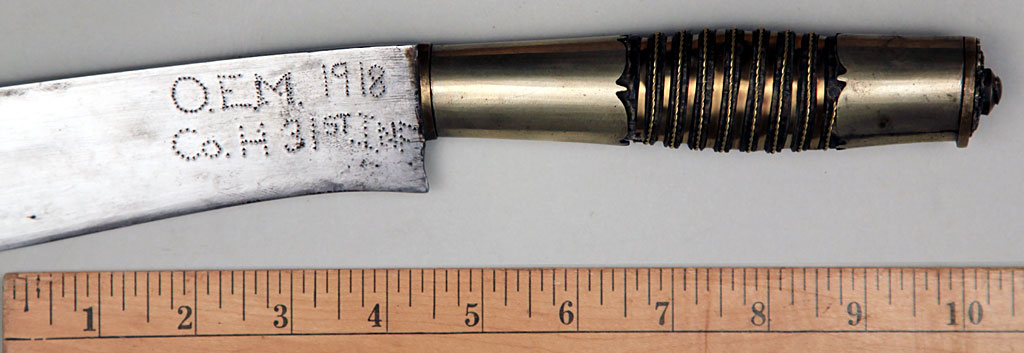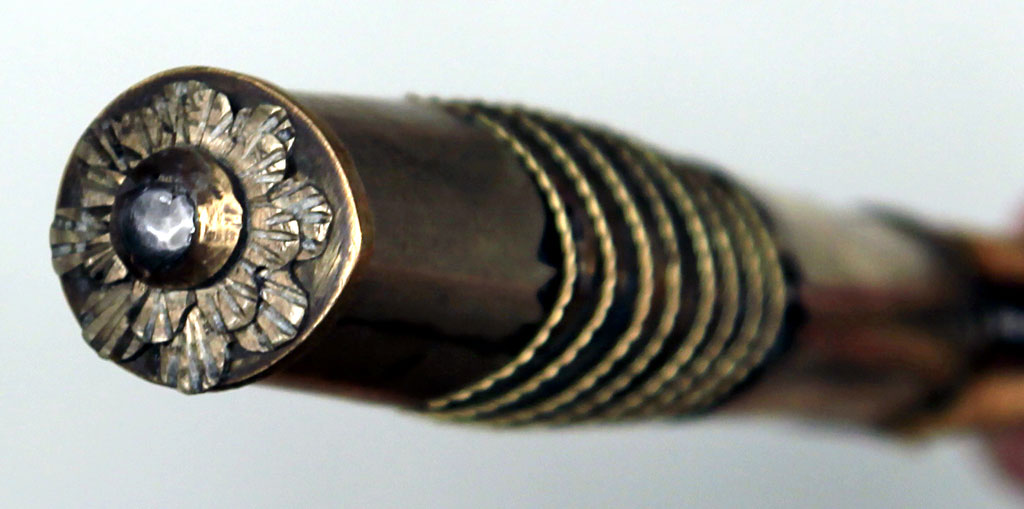
 |
|
|
|
|
#1 |
|
Vikingsword Staff
Join Date: Dec 2004
Location: The Aussie Bush
Posts: 4,195
|
In a recent thread about "Negrito" knives and bolos we talked about some of the knives shown in a figure from Fox's article The Pinatubo Negrito (1947). Of particular note was the hundang and its distinctive wooden scabbard. This knife is a common weapon of the Negrito as well as a general utility knife.
Another recent thread provided information about the dipalata, a less common fighting knife used by the Negrito. Another uncommon Negrito fighting knife is the katana, which is also pictured in Fox, figure 9 (see attached). The katana is a narrow bladed large knife/short sword with a distinctive blade profile and a tang set toward the back of the blade. The close similarity of the illustrated example of a katana in Fox and the more familiar Ilocano tabak is probably more than coincidental. Although accomplished smiths, the Negritos have been a longstanding iron poor culture, with the result that they acquired iron and iron objects (including blades) from neighboring ethnic groups. This is mentioned specifically by Fox. It seems very likely that the Negrito katana is adapted from, and in some cases is actually, an Ilocano tabak. To illustrate this more fully, two Ilocano tabak are shown below the figure from Fox. The two characteristically Ilocano hilts on these knives differ from the one illustrated by Fox, which is a more traditional Spanish-style three part hilt. It appears that the Negrito katana and the Ilocano tabak are essentially the same knife, and it is quite possible that the Negrito knives were tabak blades acquired from the neighboring Ilocano. Ian Last edited by Ian; 3rd April 2017 at 07:01 AM. |
|
|

|
|
|
#2 |
|
Member
Join Date: Dec 2004
Posts: 737
|
Beatiful post !!! reciently I have sold similar piece.
Thanks Carlos |
|
|

|
|
|
#3 | |
|
Member
Join Date: Aug 2007
Location: Germany, Dortmund
Posts: 8,761
|
Quote:
thank you for bringing up this interesting topic. I agree with you that the Negrito katana is the same knife as the Ilocano tabak but it seems that the Negritos designed their own scabbard style for this knife. Regards, Detlef |
|
|
|

|
|
|
#4 | |
|
Vikingsword Staff
Join Date: Dec 2004
Location: The Aussie Bush
Posts: 4,195
|
Quote:
|
|
|
|

|
|
|
#5 |
|
Vikingsword Staff
Join Date: Dec 2004
Location: The Aussie Bush
Posts: 4,195
|
Carlos:
Thanks very much for posting your picture. Looks like another nice example of an Ilocano tabak in its leather sheath. This one could be older judging from the three-part Spanish hilt. Ian. |
|
|

|
|
|
#6 |
|
Vikingsword Staff
Join Date: Dec 2004
Location: The Aussie Bush
Posts: 4,195
|
Here is a link to another example from Lew Waldman's Collection posted on this web site. The hilt on this one is very similar to the illustration in Fox's article.
Ian.       
|
|
|

|
|
|
#7 |
|
EAAF Staff
Join Date: Dec 2004
Location: Louisville, KY
Posts: 7,219
|
I always thought that these tabak were Pampangan in origin and not Ilocano.
 Here is a link to what I am talking about: http://www.vikingsword.com/vb/showthread.php?t=3464 Last edited by Battara; 8th April 2017 at 01:23 AM. |
|
|

|
 |
|
|